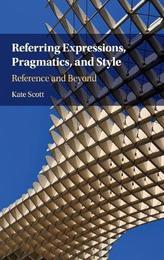
|
Referring Expressions, Pragmatics, and Style: Reference and Beyond
Hardback
Main Details
| Title |
Referring Expressions, Pragmatics, and Style: Reference and Beyond
|
| Authors and Contributors |
By (author) Kate Scott
|
| Physical Properties |
| Format:Hardback | | Pages:198 | | Dimensions(mm): Height 235,Width 156 |
|
| Category/Genre | Semantics |
|---|
| ISBN/Barcode |
9781107177574
|
| Classifications | Dewey:401.456 |
|---|
| Audience | | Professional & Vocational | |
|---|
| Illustrations |
Worked examples or Exercises; 2 Tables, black and white
|
|
Publishing Details |
| Publisher |
Cambridge University Press
|
| Imprint |
Cambridge University Press
|
| Publication Date |
7 November 2019 |
| Publication Country |
United Kingdom
|
Description
Reference is a major theme in the study of language and language use. Providing a relevance-theoretic account of reference resolution, this book develops our understanding of procedurally encoded meaning by exploring its function and role in reference resolution. A range of referring expressions are discussed, including definite descriptions, demonstratives and pronouns. Existing work on the pragmatics of reference has largely focused on how reference is resolved. However, speakers can do much more than just secure reference when they use a referring expression. A speaker's choice of expression might communicate information about their attitudes and their emotions, and referring expressions can also be used to create stylistic and poetic effects. The analyses in this book widen the focus to consider these broader effects, and the discussions and arguments presented take seriously the idea that referring expressions can contribute to meaning and communication in a way that goes beyond reference.
Author Biography
Kate Scott is a Senior Lecturer at Kingston University, London. She has published widely on reference, prosody and the pragmatics of online communication and is joint editor of Relevance, Pragmatics and Interpretation (Cambridge, forthcoming).
Reviews'In all, Scott's first monograph is a valuable contribution to the study of reference and the first of its kind which brings together all the various and disparate literatures on a seemingly simple yet astonishingly intricate topic in the study of utterance comprehension. It should be praised in particular for its treatment of stylistic effects, which is where it contributes the most original argument.' Julia Kolkmann, Journal of Pragmatics
|